Simon Guerrier's Blog, page 49
October 16, 2019
Crooked Heart, by Lissa Evans
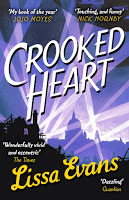 Old Baggage
, which I loved, is a prequel to this brilliant, comic novel about bad behaviour during the Second World War.
Old Baggage
, which I loved, is a prequel to this brilliant, comic novel about bad behaviour during the Second World War.We begin a little after Old Baggage left off, with eccentric ex-Suffragette Mattie Simpkin living just off Hampstead Heath with the small boy, Noel Bostock, she's sort of not-quite adopted. But Mattie's memory and wits are fast escaping her, and when war breaks out Noel is sent to St Albans with other evacuees. There, he's taken on by Vera Sedge, who thinks he might help earn some money in the latest of her ill-fated scams. But nerdy, lonely, grieving Noel has ideas about how to improve their takings...
Evans conjures a dirty, drab and distinctly criminal Blitz, where even the wardens are on the take - I think the most distressing, haunting moment is a woman being led off to an asylum while her house is robbed by the men ostensibly helping her. Life is hard even before the bombs start falling, full of tragedy and meanness and indifference. But as we weave our way through Noel and Vee's adventures, and those of Vee's own mother and son, there's the promise of something to light up the dark - hope of connection, perhaps even a little joy.
That's the gift here: so much of what happens is miserable, so much of what's described is viscerally horrible. And yet the character, the humour, the compassion shine through and make every page a delight.
Published on October 16, 2019 09:13
October 11, 2019
The Calculating Stars, by Mary Robinette Kowal
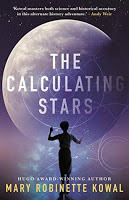 This smart, thrilling, brilliant new novel is about the women who are part of the astronaut programme in an alternate 1950s. History diverges from ours on 2 November 1948 when Thomas E Dewey beats Harry S Truman in the US presidential election. By 3 March 1952, the US has put its third satellite into orbit. That morning, a meteorite crashes into Earth with devastating effect. Washington DC is obliterated.
This smart, thrilling, brilliant new novel is about the women who are part of the astronaut programme in an alternate 1950s. History diverges from ours on 2 November 1948 when Thomas E Dewey beats Harry S Truman in the US presidential election. By 3 March 1952, the US has put its third satellite into orbit. That morning, a meteorite crashes into Earth with devastating effect. Washington DC is obliterated.So, despite the devastation the space programme is well ahead. In our universe, the space race began years after this, on 30 August 1955, when lead engineer Sergei Korolev got the Soviet Academy of Sciences to agree a programme to beat the Americans into orbit. The result was Sputnik (4 October 1957), followed by the first person - Gagarin - sent into space, on 12 April 1961. A month later, President Kennedy announced plans to land people on the Moon by the end of the decade.
Part of the joy of The Calculating Stars is how much of "our" history is woven into the alternate timeline: our heroine, Dr Elma York meets Wernher von Braun, while among her fellow trainee astronauts listed on page 426 are "Collins, Aldrin and Armstrong". Her husband reads science-fiction by Ray Bradbury, his visions of settlements on Mars apparently coloured by the events in this timeline.
Also great is the technical detail. We encouter this world through Elma's perspective as a former WASP, a qualified pilot and extremely competent mathematician. She works as a human computer, outperforming the nascent IBM machines - at one extremely tense moment in the story, her speed and accuracy with complex numbers are vital. Robinette Kowal's acknowledgements include real astronauts and other experts: she admits she doesn't understand the maths herself. As a nerd for the early days of space travel, there was lots I recognised - and lots that came as new.
"There is something about having your legs over your head that makes you need to pee. This makes it into none of the press releases, but every single astronaut talks about it." (p. 493)But the book is also excellent on the social detail: the drama of this post-meteorite world is overshadowed by inherent sexism and racism, our Jewish heroine not immune to her own prejudice. Elma also suffers from anxiety and there's lots on the shame and secrecy surrounding mental illness. Characters are well drawn, and Elma must learn to work alongside people she doesn't necessarily like, managing rivalries and her own privilege, for all she is discriminated against. Each chapter opens with a quote from a newspaper filling in more of the background detail of this world, and full of telling turns of phrase. It all makes for a rich and real version of history, a compelling world in which this adventure takes place.
It is an adventure, full of twists and turns. Robinette Kowal nicely manages the personal stakes with the technical and global. I zipped through the almost 500 pages and am keen for the next instalment.
Published on October 11, 2019 06:43
October 3, 2019
Becoming, by Michelle Obama
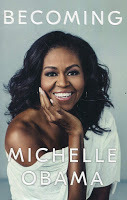 When Michelle Obama was supporting her husband's bid to be president of the USA, she used to tell her own story. Growing up in a "cramped apartment on the South Side of Chicago", as the blurb on her autobiography puts it, she could never have dreamed of where she'd end up. But her story and that of her husband, she argues, is proof that we can achieve anything with hard work and hope.
When Michelle Obama was supporting her husband's bid to be president of the USA, she used to tell her own story. Growing up in a "cramped apartment on the South Side of Chicago", as the blurb on her autobiography puts it, she could never have dreamed of where she'd end up. But her story and that of her husband, she argues, is proof that we can achieve anything with hard work and hope.In that aspirational message, Becoming reminded me of Chris Hadfield's An Astronaut's Guide to Life on Earth, a life story just as inspiring and daunting. Except that Obama is writing as her husband's successor attempts to expunge all trace of what was achieved in those years in office. Obama does not mince her words about Trump: her horror directed not just at him but at the part of America that embraced him. Other adversaries go unnamed or she reconciles with later. Her hostility to Trump is in notable contrast to the friendships made across the political divide, such as with the Bush family, or across national and social boundaries such as with the Queen.
She doesn't make a link but I did to the one other person to whom she gives no quarter. Taking us through the night that her husband had Osama Bin Laden killed, she details the delight and excitement she shared with others in the White House and beyond, the vindication she felt for the wounded soldiers and their families she'd encountered up to that point.
"I'm not sure anyone's death is a reason to celebrate. But what America got that night was a moment of release, a chance to feel its own resilience." (p. 364)For all Obama says she's "not sure" about celebrating his death, she has no doubts about the killing itself. Elsewhere, she is open about her uncertainties - whether Barack should stand in the first place, what being in office has done to their children's lives. I was struck by her frankness about fertility treatment, the grim practicalities of Clomid and IVF. There's the slips in her speeches, seized upon by her critics. There's the time when she can't face the grieving community after yet another shooting. And then there's this extraordinary, awful acknowledgement - guilt - that the rise of the right in America is in some ways directly personal.
"For more than six years now, Barack and I had lived with an awareness that we ourselves were a provocation ... Our presence in the White House had been celebrated by millions of Americans, but it also contributed to a reactionary sense of fear and resentment among others. The hatred was old and deep and as dangerous as ever." (p. 397)Yet she remains optimistic, even to the end. Becoming challenges the reader to step up and make a difference, and offers fascinating insight into the practicalities of public office. We learn how she managed her image and needed lessons in smiling, how she decided what she and her children would wear on stage, how she created her own role as First Lady. There's the difficulty of having a date night when your husband is president, or the strange feeling of addressing a huge crowd from behind a shield of bullet-proof glass.
In fact, the security involved is the most telling detail of life in the White House. Obama is daunted by her first sight of the presidential motorcade. Obama explains how difficult all that fanfare is for doing simple things like looking at potential schools for her children, or letting them go for ice cream with friends. She tells us about the challenge of finding a way out of the White House one particular night, the usual door locked even to her. On another occasion, she shares details of a nightmare in which animals roam the grounds of the building and attack her daughters.
One detail stuck with me. The White House is so heavily defended, its walls and windows so secure, that she couldn't hear the Marine One helicopter when it landed right outside.
"I usually figured out that Barack had arrived home from a trip not by the sound of his helicopter but rather by the smell of its fuel, which somehow manage to permeate." (p. 398)
Published on October 03, 2019 04:47
September 27, 2019
Science of Storytelling review
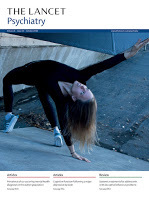 The new issue of medical journal The Lancet Psychiatry includes my review of The Science of Storytelling by Will Storr. You need to pay to read the review but here's the opening grab:
The new issue of medical journal The Lancet Psychiatry includes my review of The Science of Storytelling by Will Storr. You need to pay to read the review but here's the opening grab:"What links the 4000-year-old Epic of Gilgamesh to the children's book Mr Nosey? According to Will Storr's The Science of Storytelling, they provide “the same tribal function” by showing a character shed a flawed worldview and antisocial habits, then be rewarded with connection and status..." Simon Guerrier, "Flaw Plans", The Lancet Psychiatry volume 6, issue 10, pe. 25, 1 October 2019I posted a little more about the book here earlier in the year. There's also an index of my pieces for the Lancet.
Published on September 27, 2019 07:00
September 22, 2019
I Love the Bones of You, by Christopher Eccleston
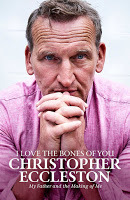 My review of Christopher Eccleston's autobiography will be published in Doctor Who Magazine #544 in just under four weeks' time. As last week's headlines made clear, it's a brave and honest account of his own and his father's struggles with mental illness, told with the intensity Eccleston brings to his acting roles.
My review of Christopher Eccleston's autobiography will be published in Doctor Who Magazine #544 in just under four weeks' time. As last week's headlines made clear, it's a brave and honest account of his own and his father's struggles with mental illness, told with the intensity Eccleston brings to his acting roles.I've, obviously, concentrated my review on what he says - and doesn't say - about his time in Doctor Who, but that's a small part of the story. As well as all the revelations about the inside of his head, it's fascinating to read his reasons for turning down roles other actors would beg for - Begbie in the film Trainspotting, Sylar in the TV series Heroes - or to learn what drama and actors inspired him. How strange to think of this iconclastic, bolshie star so bristling with terror when meeting his own heroes, whether actor, footballer or pop star. He tells us that, having been wary of Doctor Who conventions in the past, he's now embracing fandom.
"It has headled something in me." (p. 167)And why not - because he's just as much the obsessive, anxious fan as the rest of us.
For a flavour of the book, here's Eccleston's recent appearance at Rose City Comic Con, answering audience questions with honesty and love:
Published on September 22, 2019 11:45
September 19, 2019
Doctor Who Magazine 543
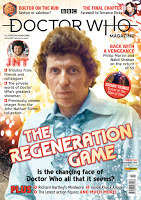 Doctor Who Magazine #543 is out in shops now, and features my interview with TV and radio presenter Stephen Cranford about his friendship with the late producer John Nathan-Turner.
Doctor Who Magazine #543 is out in shops now, and features my interview with TV and radio presenter Stephen Cranford about his friendship with the late producer John Nathan-Turner.Nathan-Turner died in 2002, and Stephen inherited his photos, tapes and paperwork relating to Doctor Who, which he's kindly shared with the clever lot working on DVDs and Blu-rays. We've been able to publish many of the photos for the first time.
Published on September 19, 2019 01:07
September 15, 2019
Case Histories, by Kate Atkinson
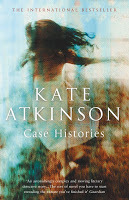 We begin with three distinct tragedies. First, in 1970, a three-year old disappears from her family home. Then, in 1994, a teenager with a summer job in the office of her solicitor dad is brutally murdered by a man who is never caught. Thirdly, in 1979, an exhausted teenage mum cracks under the strain and attacks her husband with an axe...
We begin with three distinct tragedies. First, in 1970, a three-year old disappears from her family home. Then, in 1994, a teenager with a summer job in the office of her solicitor dad is brutally murdered by a man who is never caught. Thirdly, in 1979, an exhausted teenage mum cracks under the strain and attacks her husband with an axe...The startling thing about these three awful happenings, each one in itself enough to sustain a mystery novel, is how funny they are before things kick off. Atkinson, whose more recent Transcription I adored, has a gift for telling, comic detail which only makes us feel the awfulness more keenly. In the first few pages, she sets up a household of wayward young daughters and their academic dad.
"What he actually did in there [his office in the family home] was a mystery to all of them. Something so important, apparently, that his home life was trifling in comparison. Their mother said he was a great mathematician, at work on a piece of research that would one day make him famous, yet on the rare occasions when the study door was left open and they caught a glimpse of their father at work, all he seemed to be doing was sitting at his desk, scowling into empty space." (p. 20)Brilliantly, Atkinson also makes sure we're paying attention from the off. On page 18, we're told in passing that these children's grandmother "succumbed to stomach cancer" a few years back. On page 24, we're told that the grandmother had also asked her son-in-law about stomach pains - him being a doctor, but unfortunately of maths.
"Cornered at a tea table covered with a Maltese lace cloth and loaded with macaroons, Devon scones and seed cake, Victor finally confirmed, 'Indigestion, I expect, Mrs Vane,' a misdiagnosis that she accepted with relief." (p. 24)We're being ensnared in a greater mystery than what happened in each awful case. Since this is also the start of a novel, we assume they're all connected somehow - and more than simply by each taking place in Cambridge.
At last, on page 69 we're introduced to Jackson Brodie, ex-army and ex-police, now private investigator. Largely but not always from his point of view we explore these cases and the effect of such awfulness on other people since. Brodie has his own issues - his estranged wife taking their daughter away to the other side of the world, and something else he keeps buried deep.
As well as him, there are chapters told from the perspective of Amelia, the chronically repressed and now grown-up sister of the vanished three year-old, and Theo the ever-grieving father of the murdered teen. We see them from Brodie's perspective and him from theirs, adding depth and nuance to the untangling of secrets. Admittedly, that structure also causes some problems: we keep jumping back and forward in time as we catch up on someone's perspective. So there's a moment when Theo discovers an unlikely character has one of Brodie's business cards; a few pages later we're in Brodie's perspective and learn why that card was handed over.
If that felt a little awkward, it's the only criticism I can find. This is a wholly absorbing novel, demanding to be rattled through. It's funny and surprising and emotionally powerful, the revelations in the last act utterly devastating. And yet, for all their impact, Atkinson also weaves in a little hope and redemption, and some quite unexpected sex.
This is the first of a series of Jackson Brodie novels - the latest published earlier this year. But Case Histories ends with everything so perfectly resolved I'm intrigued to see how Atkinson plunges the poor man back into untangling other people's misery. I shall be back for One Good Turn.
Published on September 15, 2019 12:28
September 14, 2019
Target Storybook cover and artwork
My masters at BBC Books tweeted that they have received a first copy of Doctor Who - The Target Storybook:
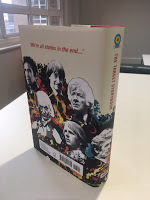
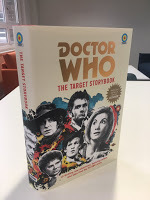
Artist Anthony Dry then provided his full, amazing artwork, definitive proof at last that Adric was the Doctor all along:
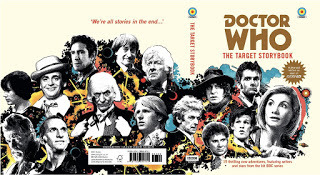
And then the account Doctor Who Comic Art tweeted the thrilling illustration by Mike Collins that accompanies my story in the book:
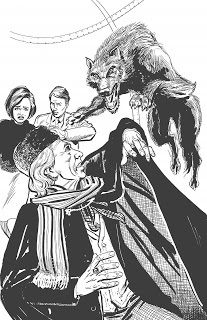
Doctor Who - The Target Storybook is on sale on 24 October.
15 thrilling new adventures, featuring writers and stars from the hit BBC series - namely Terrance Dicks, Matthew Sweet, Simon Guerrier, Colin Baker, Matthew Waterhouse, Jenny T Colgan, Jacqueline Rayner, Una McCormack, Steve Cole, Vinay Patel, George Mann, Susie Day, Mike Tucker, Joy Wilkinson and Beverly Sanford.
We’re all stories in the end…
In this exciting collection you’ll find all-new stories spinning off from some of your favourite Doctor Who moments across the history of the series. Learn what happened next, what went on before, and what occurred off-screen in an inventive selection of sequels, side-trips, foreshadowings and first-hand accounts – and look forward too, with a brand new adventure for the Thirteenth Doctor.
Each story expands in thrilling ways upon aspects of Doctor Who’s enduring legend. With contributions from show luminaries past and present – including Colin Baker, Matthew Waterhouse, Vinay Patel, Joy Wilkinson and Terrance Dicks – The Target Storybook is a once-in-a-lifetime tour around the wonders of the Whoniverse.
Imprint: BBC Books
Published: 24/10/2019
ISBN: 9781785944741
Length: 432 Pages
Dimensions: 240mm x 39mm x 162mm
Weight: 667g
RRP: £16.99
https://www.penguin.co.uk/books/111/1118653/doctor-who--the-target-storybook/9781785944741.html


Artist Anthony Dry then provided his full, amazing artwork, definitive proof at last that Adric was the Doctor all along:

And then the account Doctor Who Comic Art tweeted the thrilling illustration by Mike Collins that accompanies my story in the book:

Doctor Who - The Target Storybook is on sale on 24 October.
15 thrilling new adventures, featuring writers and stars from the hit BBC series - namely Terrance Dicks, Matthew Sweet, Simon Guerrier, Colin Baker, Matthew Waterhouse, Jenny T Colgan, Jacqueline Rayner, Una McCormack, Steve Cole, Vinay Patel, George Mann, Susie Day, Mike Tucker, Joy Wilkinson and Beverly Sanford.
We’re all stories in the end…
In this exciting collection you’ll find all-new stories spinning off from some of your favourite Doctor Who moments across the history of the series. Learn what happened next, what went on before, and what occurred off-screen in an inventive selection of sequels, side-trips, foreshadowings and first-hand accounts – and look forward too, with a brand new adventure for the Thirteenth Doctor.
Each story expands in thrilling ways upon aspects of Doctor Who’s enduring legend. With contributions from show luminaries past and present – including Colin Baker, Matthew Waterhouse, Vinay Patel, Joy Wilkinson and Terrance Dicks – The Target Storybook is a once-in-a-lifetime tour around the wonders of the Whoniverse.
Imprint: BBC Books
Published: 24/10/2019
ISBN: 9781785944741
Length: 432 Pages
Dimensions: 240mm x 39mm x 162mm
Weight: 667g
RRP: £16.99
https://www.penguin.co.uk/books/111/1118653/doctor-who--the-target-storybook/9781785944741.html
Published on September 14, 2019 02:50
September 12, 2019
Fingers in the Sparkle Jar, by Chris Packham
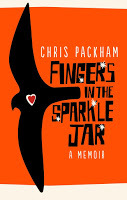 I've had a busy few weeks - as a guest at the Hastings Literary Festival, working through notes on various things and researching and writing various others - and so made slowish progress through this remarkable memoir by Chris Packham.
I've had a busy few weeks - as a guest at the Hastings Literary Festival, working through notes on various things and researching and writing various others - and so made slowish progress through this remarkable memoir by Chris Packham.As I knew from his 2017 documentary, Aspergers and Me, Chris is autistic and his heightened senses can often be overwhelming. His memoir is a series of vividly recalled and felt moments from his childhood: passion, terror, injustice, the tactile delight of sniffing, touching, tasting nature such as drinking frogspawn. Some of it is very funny, some is pretty harrowing - not least the jumps forward to 2003-4 where it all got too much and he tried to take his own life.
At one point, he richly describes his first efforts to blow out the contents of a bird's egg he's carefully filched. It doesn't work and the egg collapses.
"The crumpled shell was soft and stuck to his fingers, the exploded mess glued to his hand, which he gradually opened. He felt sick with the shock of it, he had the gummy taste of raw egg in his mouth and he now knew why he had been unable to force the contents out of the pinhole. Looking like a bubblegum bogey bathed in shiny spittle a fully developed sparrow embryo lay on its back - bulbous-bellied, big-headed and black-eyed, with a broad waxy bill and peg-like wings and legs, its toes pricked with minuscule claws. He turned it over. It was dead. If he hadn't stolen the egg it would have hatched by now, or at least by tomorrow." (pp. 201-2)Given that a trait of autism can be a failure to see things from other people's perspective, Packham recounts several moments in the third-person pespective of people around him - a neighbour, a bully at school, his own sister - which raises questions of authenticity, of truthfulness. How much of these and his own recollections are invented, sensations and colour added not felt at the time? But the effect is to show that everyone else had their passions and fears, that this strange little boy is not so alone in his weirdness.
Packham grew up not far from where I did in Hampshire, if at least a decade before me. His prose is peppered with slang that transported me right back: gob, guffs and jaspers (wasps), kids who chucked up when sick and creased up rather than laughed.
But lots of the book struck a chord as the father of an autistic child who is obsessive about bits of nature - snails and sharks and sea creatures. I'm wowed by his parents' patience and continued encouragement as he boils up skulls or brings home a bird of prey. He mentions but I can well see how hard this could all for his sister, for ever being overlooked by being the easier one. The power of the book is that Packham isn't alone and so seeing the world from his point of view is a revelation.
Published on September 12, 2019 08:35
August 23, 2019
Post Öykü 28
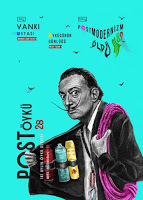 Issue 28 of Post Öykü, published in May but I only just found out, includes my short story "The Artficial Bees" as "Yapay Arılar", translated into Turkish by Selma Aksoy Türköz.
Issue 28 of Post Öykü, published in May but I only just found out, includes my short story "The Artficial Bees" as "Yapay Arılar", translated into Turkish by Selma Aksoy Türköz.Randall bir ayağını yeşil liflerin üstüne indirdi. Organik madde, ağırlığının altında kaldı ama onu taşıyor gibi görünüyordu. Öbür ayağını da o garip otsu materyalin üstüne koymaya cesaret etti. Tam o anda Arşiv bir cevapla geri döndü.Read the English version of "The Artifical Bees" on the Uncanny magazine website.
“Bir çim,” dedi ona. “Operasyona devam et.” Randall çimin içinde ışığa doğru ilerledi ihtiyatla. Şüpheli bölgeye girerken sensörleri elektromanyetik dalgaların yüksek akımına uğradı. Karanlık endüstriyel arazideki yılların ardından ışık bir anlığına kör etti gözlerini. “Elli beş terahetrz,” dedi Arşiv. Randall gözlerindeki renkli noktaları yakıp söndürerek camın içindeki dünyayı hedef alıyordu...
Published on August 23, 2019 01:00
Simon Guerrier's Blog
- Simon Guerrier's profile
- 60 followers
Simon Guerrier isn't a Goodreads Author
(yet),
but they
do have a blog,
so here are some recent posts imported from
their feed.



